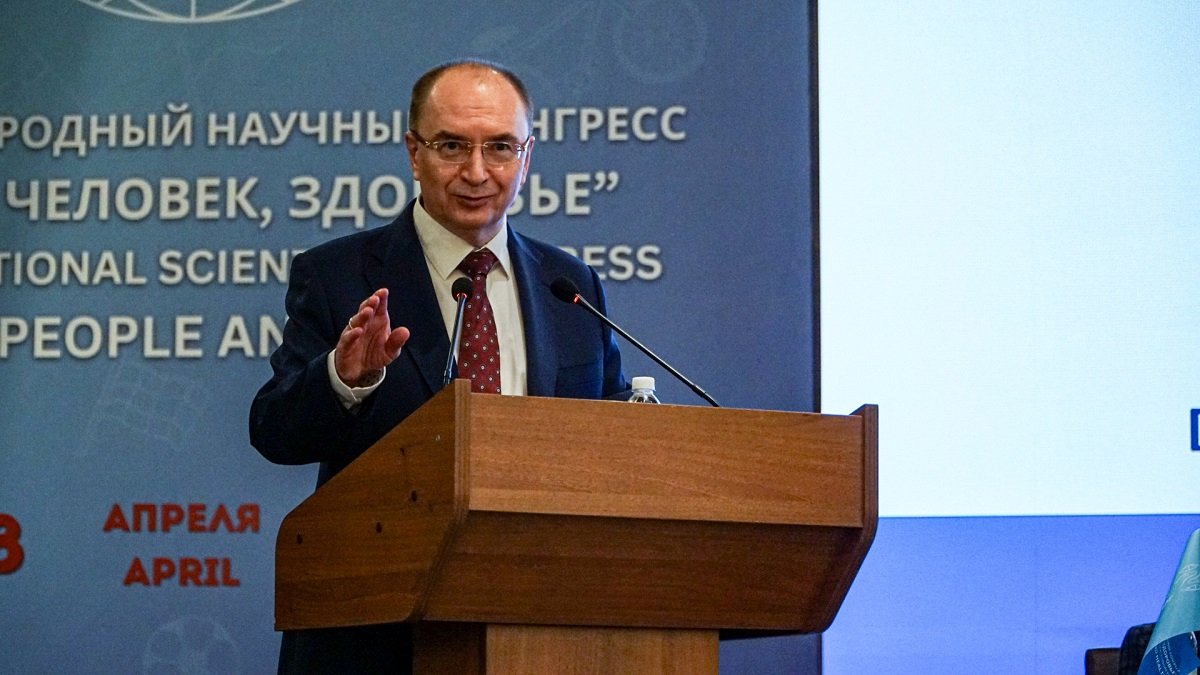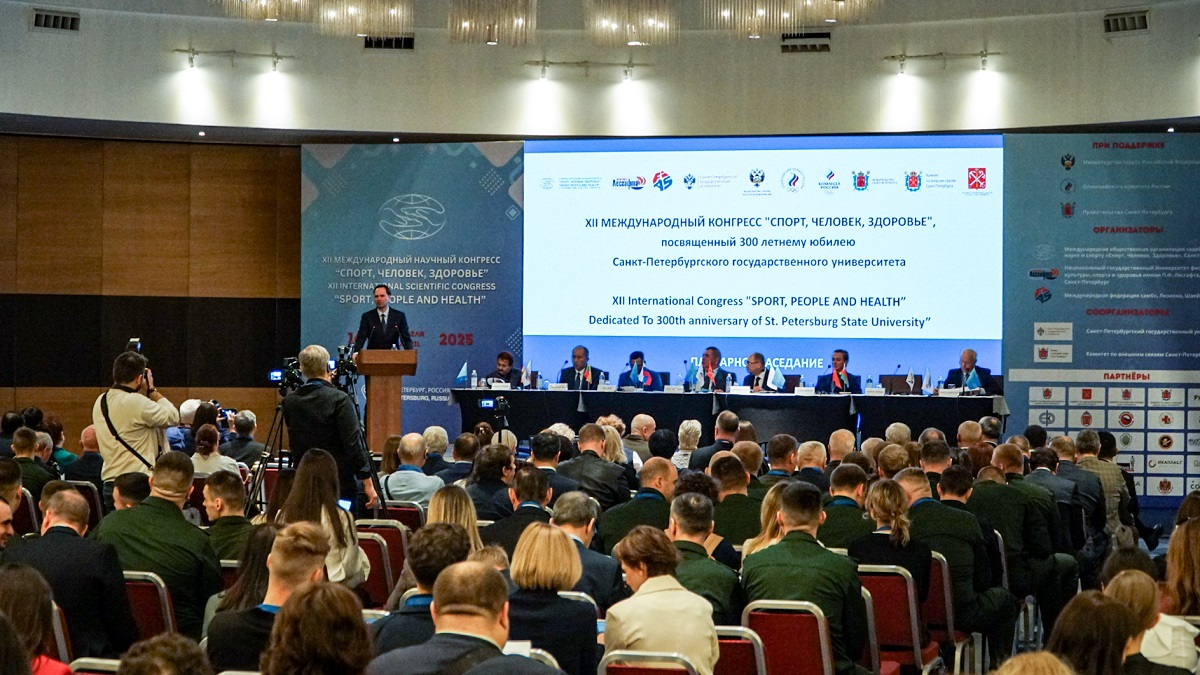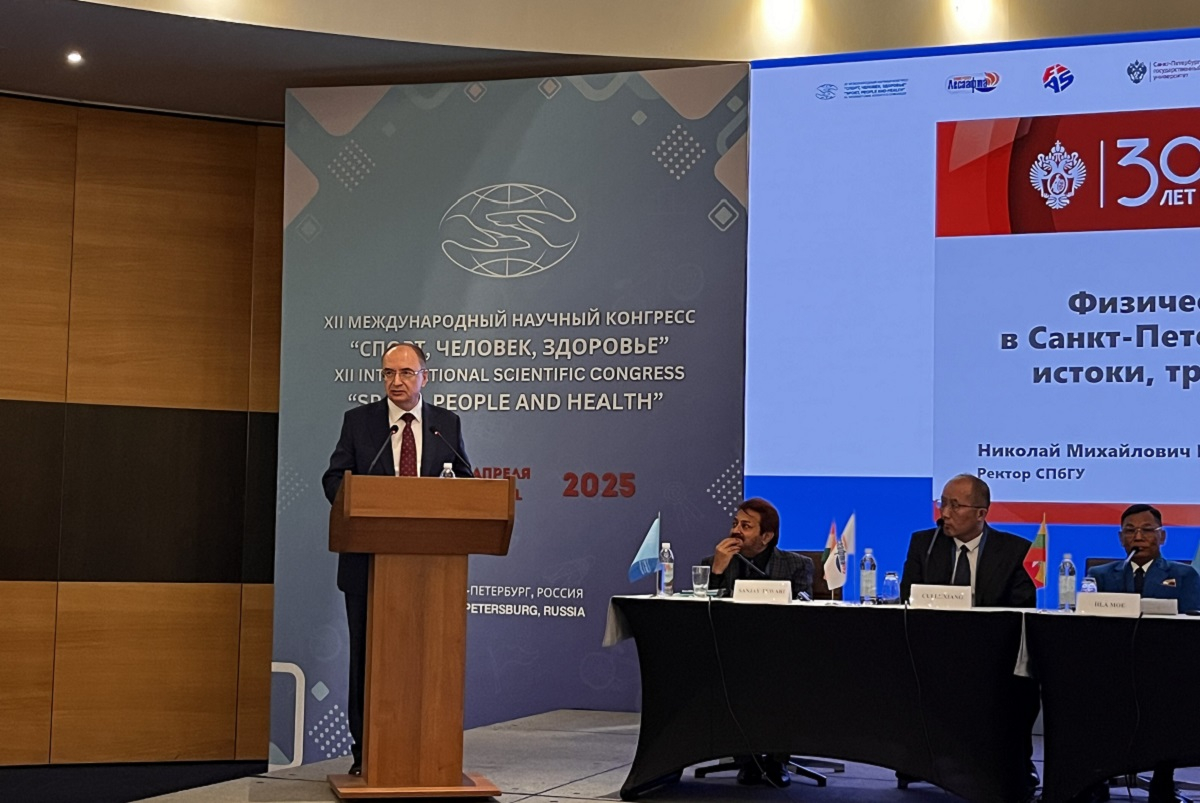Rector of St Petersburg University: "Our goal is to raise both intelligent and healthy young people"
The 12th International Scientific Congress "Sport, People and Health" has commenced in St Petersburg, gathering scholars, academics, and coaches from 23 countries. In keeping with tradition, St Petersburg University is co-organising the event, which this year is dedicated to the 300th anniversary of the University.
The opening ceremony of the Congress was attended by: Vasily Shestakov, Chair of the Executive Board of the International Public Organisation for the Promotion of Science and Sport "Sport, People and Health" and President of the International SAMBO Federation (FIAS); Vadim Grishkov, Acting Rector of the Lesgaft National State University of Physical Education, Sport and Health; and other distinguished guests.
The Congress received a greeting message from Dmitry Chernyshenko, Deputy Chairman of the Government of the Russian Federation and Member of the Board of Trustees of St Petersburg University. He highlighted that over its 20-year history, the "Sport, People and Health" Congress has evolved into a respected platform for dialogue and the exchange of experiences and best practices, traditionally addressing a wide range of issues. This year, the Congress focuses on advancing the international sports movement. Dmitry Chernyshenko expressed confidence that experts will be able to develop initiatives and ideas to strengthen international cooperation in sports and promote the values of a healthy lifestyle.
In his address to the Congress participants, Alexander Beglov, Governor of St Petersburg and Member of the Board of Trustees of St Petersburg University, noted that for many years, the Congress has played a crucial role in addressing urgent issues in modern sport and challenges of our times. It has always been instrumental in facilitating the consolidation of like-minded people. "I am confident that the Congress will continue to significantly contribute to strengthening Olympic ideals and principles, as well as the moral values of global sport, uniting the efforts of the international research community, public and state organisations in achieving the vital goals of physical, spiritual, and moral development."
According to Vasily Shestakov, President of the International SAMBO Federation and Head of the Council of the Physical Education and Sport bachelor’s and master’s programmes at St Petersburg University, the main topics of the 12th International Scientific Congress "Sport, People and Health" include examining the development trends of the sports movement within global sports systems and assessing the current phase of renewal in the international sports movement.
The mission of our Congress is to establish international discussion platforms for addressing topical issues within the global sports movement.
Vasily Shestakov, President of the International SAMBO Federation
"The Congress, founded on the principles of open discussion, provides the opportunity for scholars and experts to present diverse, and even opposing, viewpoints, facilitating the exploration of the most pressing issues in global sports. The scholarly sections and panel discussions feature a broad spectrum of research schools, opinions, and ideas, reflecting the varied interests of leading scholars, practitioners, and experts in the field of sport and health," underlined Vasily Shestakov.
When greeting the Congress participants, Taliya Khabrieva, Director of the Institute of Legislation and Comparative Law under the Government of the Russian Federation, Deputy President of the Russian Academy of Sciences, and Honorary Doctor of St Petersburg University, noted that the Congress theme — "Sport, People and Health" — has consistently been a focal point for the research community. She stressed that these words carry significant independent constitutional value.
"We may say that this signifies the present-day Russian legal order, which develops through the Constitution in conjunction with the social parameters of the states, with one of the primary parameters being human health," said Taliya Khabrieva.
Rector of St Petersburg University Nikolay Kropachev expressed his gratitude to the organisers of the Congress for dedicating this large-scale event to the 300th anniversary of St Petersburg University.
"There are many specialised sports higher education institutions in Russia; however, it is important to keep in mind that physical education and sport in Russian non-military higher education institutions originated at St Petersburg University. It is therefore a great honour for me to thank you for your decision and wish all participants in the Congress every success in their efforts to make sport an integral part of our everyday lives. We have every opportunity to achieve this," underlined Nikolay Kropachev.
The Congress participants received warm greetings from: Dmitry Chernyshenko, Deputy Chairman of the Government of the Russian Federation and Member of the Board of Trustees of St Petersburg University; Alexander Belsky, Chairman of the Legislative Assembly of St Petersburg; Svetlana Khorkina, two-time Olympic champion, Honoured Master of Sports of Russia; and other distinguished figures.
Professor Nikolay Kropachev, Rector of St Petersburg University, opened the plenary session with a presentation on the history of the development of physical education and sport at St Petersburg University.
"St Petersburg University has made significant contributions to the development of physical education and the sports movement in Russia. The University students played a key role in establishing a number of sports as academic disciplines and driving the entire sports movement in our country. Throughout the three centuries of St Petersburg University’s history, its students and academics have always been distinguished by their pursuit of comprehensive development. It is for this reason that among our graduates are many renowned athletes, known worldwide today," said Nikolay Kropachev, Rector of St Petersburg University.

For example, the first specialised indoor sports facility in Russia is the Jeu de Paume building, i.e. a house designed for a ball-and-court game. It was built during the era of Catherine the Great for the First Cadet Corps. In 1867, the building was transferred to St Petersburg Imperial University and began to be used for the practical training of gymnastics teachers. Today, the building houses facilities for various sports. Its façade is utilised for training the St Petersburg University climbing and mountaineering teams, as well as for interuniversity competitions.
One of the first officially registered student competitions among higher education institutions in St Petersburg took place on 12 October 1891. It was a chess match between the teams of St Petersburg Imperial University and the St Petersburg Institute of Technology, which resulted in a victory for the University team.
In June 1901, a significant milestone in the development of student sports in Russia occurred with the opening of a practice room for Swedish gymnastics and athletics courses on the campus of St Petersburg Imperial University. Ivan Lebedev, a student of the Faculty of law and the initiator of this idea, was appointed Head of the courses. He later played a key role in organising sports clubs at the Military Medical Academy, Polytechnic Institute, and Forestry Institute in St Petersburg. As the University lecturer, Ivan Lebedev was also chosen as a member of the subcommittee on physical development in secondary schools. In his honour, the Uncle Vania Cup was organised at St Petersburg University in 2022, commemorating the founder of the gymnastics and athletics courses.
Throughout the rich history of St Petersburg University, its students, academics, and graduates have repeatedly become prominent figures in various sports and have played key roles in organising the national Olympic movement. Under the leadership of Vyacheslav Sreznevsky, a graduate of the Faculty of History and Philology at St Petersburg Imperial University and son of the renowned Slavonic scholar Izmail Sreznevsky, the first World Figure Skating Championship was held in St Petersburg in 1896.
In 1911, Vyacheslav Sreznevsky was elected the first Chairman of the Russian Olympic Committee, while Georges Duperron, the organiser of the first in Russia Football league — the St Petersburg Football League — and a graduate of the University’s Faculty of Law, became the Secretary of the committee. From 1913 to 1915, he was a member of the International Olympic Committee. At the 1908 Olympic Games in London, Russia was represented by eight participants, including two members of the University community: Georgy Demin, a law student (wrestling, lightweight), and Nikolai Panin-Kolomenkin, a graduate of the Faculty of Physics and Mathematics (figure skating). Competing under the name of Nikolai Panin, Kolomenkin became the first Russian athlete to win an Olympic gold medal.
Since 1952, when the Soviet Union became a full-fledged participant in the Olympic Games, few Games have occurred without athletes representing St Petersburg University. Tatyana Kazankina, a three-time Olympic champion, world and Olympic record holder in track and field athletics, and Honoured Master of Sports of the USSR, studied at Leningrad State University. Today, Tatyana Kazankina actively participates in the life of her alma mater and is a member of the Council for the Physical Education and Sport bachelor’s and master’s programmes.
In 1928, Leningrad State University’s administration made physical education a compulsory course for all faculties. In the 1930s, a multi-purpose sports complex was created on the University campus to facilitate student physical education. This complex included a stadium, tennis courts, volleyball and basketball courts, a shooting range, and other facilities. Today, St Petersburg University upholds its traditions and continues to promote physical education and sport. In 2019, the University launched the bachelor’s programme "Physical Training and Sport", followed by a master’s programme in the same field in 2024. Additionally, St Petersburg University offers a unique master’s programme titled "Lawyer in the Field of Sports Law (Sports Lawyer)".

Professor Nikolay Kropachev underlined that sport is not only a tool for personal development but also a significant research area for St Petersburg University scholars across various fields. For instance, the University’s Laboratory of System Adaptations research team focuses on studying mechanisms of human adaptation to extreme environmental conditions, including physical, informational, cold, and hypoxic stresses. Medical researchers at the Institute of Medicine at St Petersburg University investigate relevant aspects of therapeutic physical exercise and sports medicine in modern reproductive medicine; athlete’s heart; and the effects of Nordic Walking in rehabilitation. Additionally, research is conducted in sports psychology, legal issues in dispute resolution in sports, and other related areas.
At present, 19 current members of Russia’s national sports teams, including world and European champions and Olympic participants, are studying at St Petersburg University. The University has 14 sports teams, with their representatives competing in student sports leagues in rowing, basketball, swimming, rugby, and football.
The International Scientific Congress "Sport, People and Health" is supported by the Ministry of Sport of the Russian Federation, the Russian Olympic Committee, and the Government of St Petersburg. This year’s participants include researchers, academics, and coaches from Armenia; Belarus; Bosnia and Herzegovina; China; the Czech Republic; India; Iraq; Iran; Israel; Italy; Kazakhstan; Kyrgyzstan; Myanmar; Palestine; Serbia; Montenegro; Türkiye; the United States; Uzbekistan; and Vietnam.
Every year, St Petersburg University holds over 50 sports, physical culture, mass, and health-improvement events, with approximately 5,000 participants. Additionally, twice a year, the University’s sports facilities, in collaboration with the Centre for Physical Education, Sports, and Health of the Vasileostrovsky District of St Petersburg, host events as part of the «Ready for Labour and Defence» (GTO) programme for university students. To date, 660 students and 53 University employees have completed the GTO programme.
"St Petersburg University aims to boost students’ motivation for engaging in physical activities and adopting a healthy lifestyle, while promoting most popular types of mass sports. Physical activity and sport should become an integral part of young people’s lives, as all-round development is key to moving forward and achieving success. Our goal is to raise both intelligent and healthy young people," said Nikolay Kropachev, Rector of St Petersburg University.



